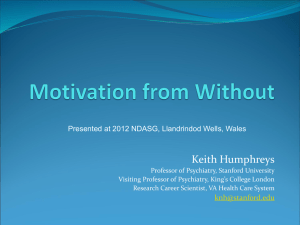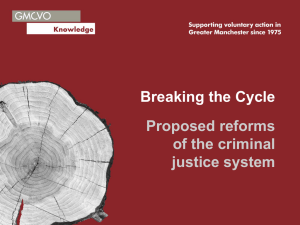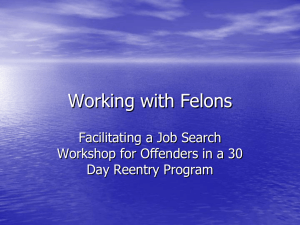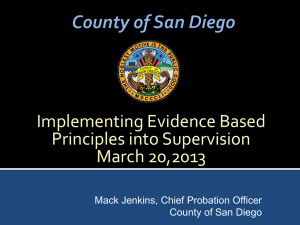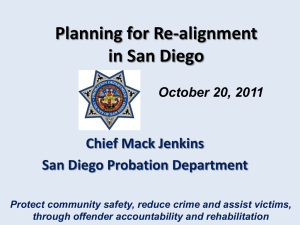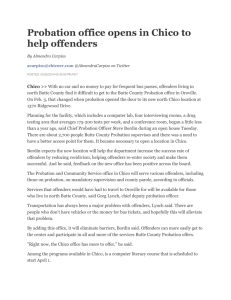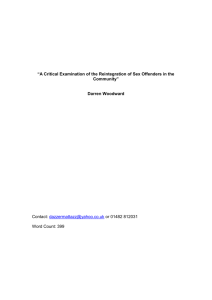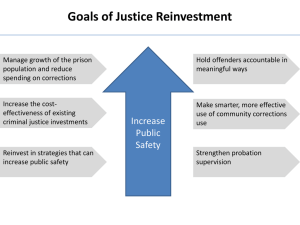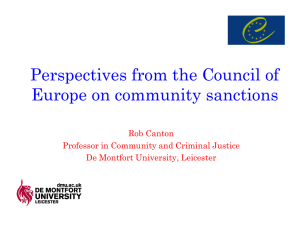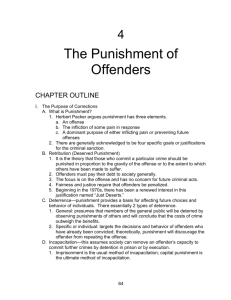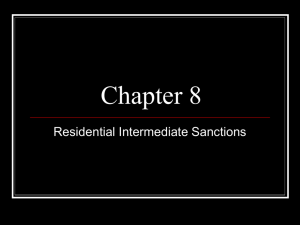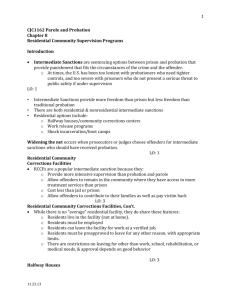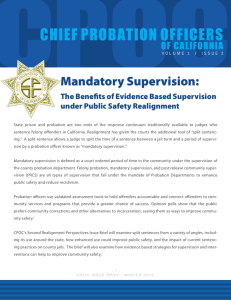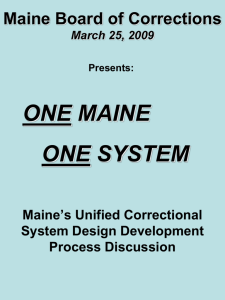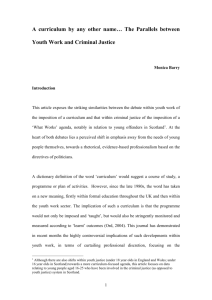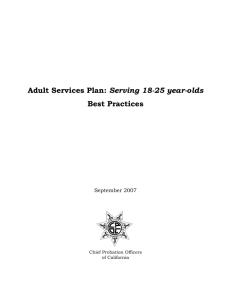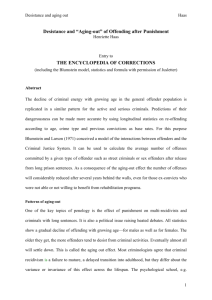September 2012 - Justice Center for Research
advertisement
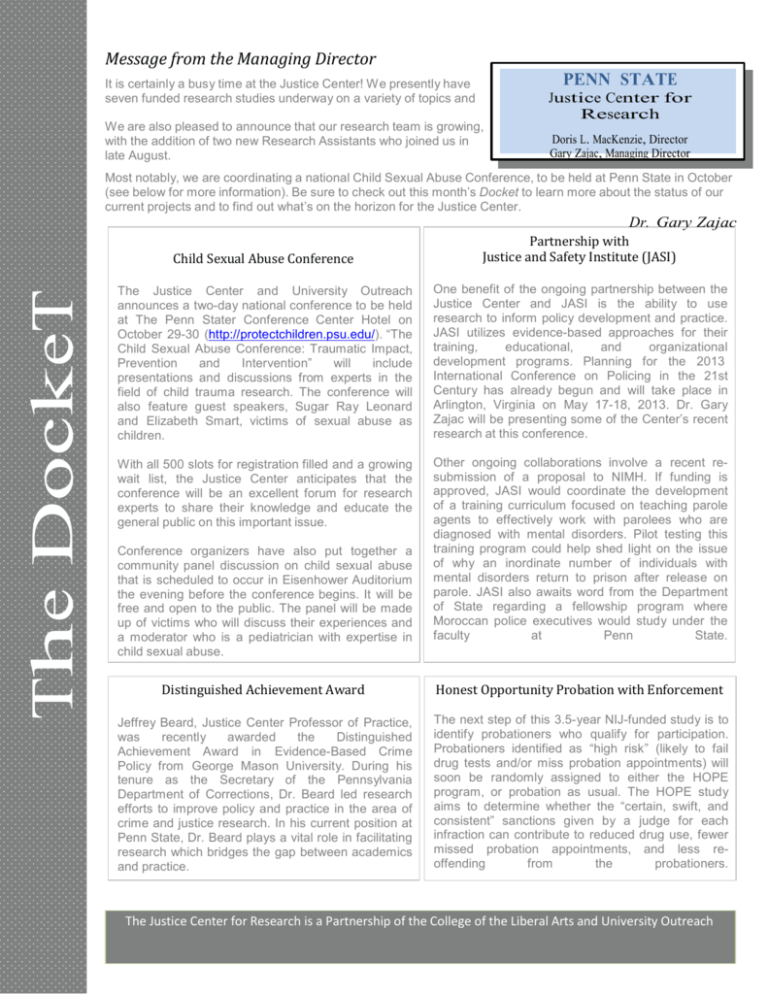
Message from the Managing Director PENN STATE It is certainly a busy time at the Justice Center! We presently have seven funded research studies underway on a variety of topics and Justice Center for Research We are also pleased to announce that our research team is growing, with the addition of two new Research Assistants who joined us in late August. Doris L. MacKenzie, Director Gary Zajac, Managing Director Most notably, we are coordinating a national Child Sexual Abuse Conference, to be held at Penn State in October (see below for more information). Be sure to check out this month’s Docket to learn more about the status of our current projects and to find out what’s on the horizon for the Justice Center. The DockeT Dr. Gary Zajac Child Sexual Abuse Conference Partnership with Justice and Safety Institute (JASI) The Justice Center and University Outreach announces a two-day national conference to be held at The Penn Stater Conference Center Hotel on October 29-30 (http://protectchildren.psu.edu/). “The Child Sexual Abuse Conference: Traumatic Impact, Prevention and Intervention” will include presentations and discussions from experts in the field of child trauma research. The conference will also feature guest speakers, Sugar Ray Leonard and Elizabeth Smart, victims of sexual abuse as children. One benefit of the ongoing partnership between the Justice Center and JASI is the ability to use research to inform policy development and practice. JASI utilizes evidence-based approaches for their training, educational, and organizational development programs. Planning for the 2013 International Conference on Policing in the 21st Century has already begun and will take place in Arlington, Virginia on May 17-18, 2013. Dr. Gary Zajac will be presenting some of the Center’s recent research at this conference. With all 500 slots for registration filled and a growing wait list, the Justice Center anticipates that the conference will be an excellent forum for research experts to share their knowledge and educate the general public on this important issue. Other ongoing collaborations involve a recent resubmission of a proposal to NIMH. If funding is approved, JASI would coordinate the development of a training curriculum focused on teaching parole agents to effectively work with parolees who are diagnosed with mental disorders. Pilot testing this training program could help shed light on the issue of why an inordinate number of individuals with mental disorders return to prison after release on parole. JASI also awaits word from the Department of State regarding a fellowship program where Moroccan police executives would study under the faculty at Penn State. Conference organizers have also put together a community panel discussion on child sexual abuse that is scheduled to occur in Eisenhower Auditorium the evening before the conference begins. It will be free and open to the public. The panel will be made up of victims who will discuss their experiences and a moderator who is a pediatrician with expertise in child sexual abuse. Distinguished Achievement Award Honest Opportunity Probation with Enforcement Jeffrey Beard, Justice Center Professor of Practice, was recently awarded the Distinguished Achievement Award in Evidence-Based Crime Policy from George Mason University. During his tenure as the Secretary of the Pennsylvania Department of Corrections, Dr. Beard led research efforts to improve policy and practice in the area of crime and justice research. In his current position at Penn State, Dr. Beard plays a vital role in facilitating research which bridges the gap between academics and practice. The next step of this 3.5-year NIJ-funded study is to identify probationers who qualify for participation. Probationers identified as “high risk” (likely to fail drug tests and/or miss probation appointments) will soon be randomly assigned to either the HOPE program, or probation as usual. The HOPE study aims to determine whether the “certain, swift, and consistent” sanctions given by a judge for each infraction can contribute to reduced drug use, fewer missed probation appointments, and less reoffending from the probationers. The Justice Center for Research is a Partnership of the College of the Liberal Arts and University Outreach Desistance from Crime over the Life Course Professor and Justice Center Faculty Affiliate, Julie Horney, and Professor Doris MacKenzie, together with RTI International, have received $998,221 in funding from NIJ to conduct a 3-year study about factors associated with desistance from crime. As a follow up to a previous RTI study, this project will continue to track offenders released from prison in 2004. In addition to analyzing arrests and incarceration since their release, the researchers will measure situational factors that could have impacted offenders’ desistance from crime and violence. These factors, including events such as marriage, divorce, employment, and education, will be assessed through a tool that Dr. Horney developed, called the Life Event Calendar. The researchers anticipate that assessing these life events as well as other leisure activities will help identify the common experiences that may lead certain groups of offenders to recidivism. Another main focus of this study involves determining how rehabilitation programs help offenders: by teaching them to change the way they think about triggering situations, or teaching offenders to avoid those situations altogether. As the study gets underway, the research team will be meeting and developing the necessary instruments. Reentry of Prisoners in Rural PA Sentencing Risk Assessment After receiving a grant from the Center for Rural Pennsylvania last spring, the Justice Center is moving forward on this study about the challenges that prisoners face as they return to rural PA. By the end of September, we will be mailing a survey to 44 rural county jail wardens to learn more about the services that are available to inmates upon their release back into the community. Dr. DeMichele, Justice Center Postdoctoral Scholar, has received funding from the Pennsylvania Sentencing Commission to develop a portion of a sentencing risk assessment instrument to be used by judges for highlevel offenders. This research will examine the relationship among offender level characteristics and sentencing decisions with offender outcomes. Julia Laskorunsky, a graduate student in the Department of Sociology’s Crime, Law & Justice Program, will be assisting with this project. Indiana Probation Workload Evaluation With funding from the Indiana Judicial Conference, Dr. Matthew DeMichele is leading a workload evaluation of Indiana Probation. Time study data will be matched to offender outcomes to determine the relationship between officer level and department level characteristics with offender recidivism. The findings from this project will inform Indiana Probation workload standards. Evaluation of Sex-Offender Reentry Program Ian Elliott, Justice Center Research Scholar and Dr. Gary Zajac were awarded $101,430 from NIJ to conduct an evaluability assessment of the Circles of Support and Accountability (COSA) reentry program. Using a restorative justice approach, COSA focuses on increasing public safety through reconciliatory action between offenders, victims, and the community. Throughout the six month study, up to five sites in the U.S. will be assessed for the ability to participate in future process and outcome evaluation. Coming up on The Docket: • Results: An Examination of Pennsylvania State Police Coverage of Municipalities • Female Inmate Co-Occurring Disorder Project • Monitoring Sex Offenders’ Use of Internet Victim-Offender Overlap Professor Richard Felson, Justice Center Faculty Affiliate, has recently been awarded a grant of $426,181 from NIJ to conduct a 4-year study about the relationship between offending and victimization. Previous research has determined that when offenders are involved in disputes, they are more likely to be victimized than nonoffenders. Moving forward on this topic, Professor Felson hopes to learn more by examining the situational context of disputes. Possible situational factors include: frequency of drinking, involvement in illegal activities, and the frequency of disputes. First steps for this study involve constructing the questionnaires. Once these questionnaires are developed, the research team will survey 500 recently admitted male inmates and will include those who have a history of violent offenses as well as those who have never committed a violent offense. A sample of nonoffenders will also be surveyed to serve as a comparison group. Justice Center for Research The Pennsylvania State University 327 Pond Laboratory University Park, PA 16802 814-867-3292 www.justicecenter.psu.edu September 2012
